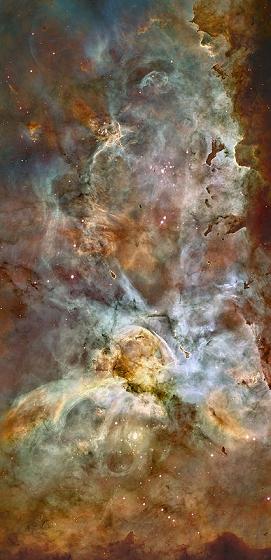Is the Multiverse theory dead? If so, what implications might this have for belief in g0d?
|
I’ve written on cosmology from time to time. Recently I picked up Brian Greene’s The Fabric of the Cosmos, which does a far better job of explaining M-theory than Hawking and Mlodinow’s recent book. At this point I need to send a public shout-out to Lunagrrrl, who sent me her copy of The Grand Design, which I previewed here. I had good intentions of reviewing it again, but I can’t add much to what I wrote. Get Greene’s book and skip to chapter thirteen instead, it’s much better. The words below were originally posted last month by Santi Tafarella in his blog, Prometheus Unbound. I think this is worth sharing. Go check out the comments on his blog too. Santi writes: |

|
In 2008, cosmologist Bernard Carr of Queen Mary University of London, told a science journalist for Discover the following:
If there is only one universe, you might have to have a fine-tuner. If you don’t want God, you’d better have a multiverse.
Carr said this because our universe appears to have numerous wildly improbable properties hard to explain by chance (especially if our known Big Bang universe is the only roll of the cosmic dice, setting its cosmological constants). Put bluntly, the cosmos appears to have been designed, and with very particular purposes in mind.
In whose mind?
Well, God’s of course!
Like an apple tree following its genetic imperatives, the universe appears to be following the imperatives of its cosmological constants. It apples galaxies, carbon-based life forms (like apple trees), and minds (like our own).
On planet Earth alone, there are 7 billion minds right now and counting.
Whooda thunk it?
Maybe Someone did.
The Discover article gave examples that illustrate our universe’s mind-boggling good luck (or creation by God, if the multiverse doesn’t come to the rescue of atheism). Here’s one:
The early universe was delicately poised between runaway expansion and terminal collapse. Had the universe contained much more matter, additional gravity would have made it implode. If it contained less, the universe would have expanded too quickly for galaxies to form.
The 2008 article that Bernard Carr was quoted in also noted this:
The credibility of string theory and the multiverse may get a boost within the next year or two, once physicists start analyzing results from the Large Hadron Collider, the new, $8 billion particle accelerator built on the Swiss-French border.
Now, fast forward to 2011. What’s the status of string theory and the multiverse in light of the data that has come in from the LHC (Large Hadron Collider)?
Answer: Not good.
Atheists, are you listening?
Theoretical physicist and mathematician Peter Woit of Columbia University, discussing this summer’s String 2011 Conference at his blog, writes that at past conferences they:
. . . often featured a call for progress towards making predictions that could be tested at the LHC [Large Hadron Collider]. With LHC data now coming in, [opening speaker David] Gross acknowledged that this had been a failure: there are no string theory LHC predictions.
None.
As for what the String 2011 Conference’s opening speaker, David Gross, said of the multiverse, here’s Peter Woit again:
Surprisingly, not a word from Gross about anthropics or the multiverse. I assume he’s still an opponent, but perhaps feels that there’s no point in beating a dying horse. Susskind isn’t there and oddly, the only multiverse-related talks are from the two speakers brought in to do public lectures (Brian Greene and Andrei Linde, Hawking’s health has kept him from a planned appearance). So the multiverse is a huge part of the public profile of the conference, but pretty well suppressed at the scientific sections. Also pretty well suppressed is “string phenomenology”, or any attempt to use string theory to do unification. Out of 35 or so talks I see only a couple related to this, which is still the main advertised goal of string theory.
A dying horse. Isn’t that sad? And remember: as goes string theory, so goes the multiverse.
And perhaps even atheism. As uber-atheist Jerry Coyne noted recently at his blog, how the multiverse debate pans out among physicists has unmistakable consequences for the God question:
[M]ultiverse theories . . . represent physicists’ attempts to give a naturalistic explanation for what others see as evidence of design.
But here’s how Peter Woit describes the String 2011 Conference summary by Jeff Harvey:
In Jeff Harvey’s summary of the conference, he notes that many people have remarked that there hasn’t been much string theory at the conference. About the landscape, his comment is that “personally I think it’s unlikely to be possible to do science this way.” He describes the situation of string theory unification as like the Monty Python parrot “No, he’s not dead, he’s resting.” while expressing some hope that a miracle will occur at the LHC or in the study of string vacua, reviving the parrot.
That the summary speaker at the main conference for a field would compare the state of the main public motivation for the field as similar to that of the parrot in the Monty Python sketch is pretty remarkable. In the sketch, the whole joke is the parrot’s seller’s unwillingness, no matter what, to admit that what he was selling was a dead parrot.
And, as for Scientific American’s recent coverage of the multiverse hypothesis, Woit is critical:
One might be tempted to criticize Scientific American for keeping this alive, but they just reflect the fact that this pseudo-science continues to have significant influence at the highest levels of the physics establishment.
The multiverse is pseudo-science. Really?
Based on what Bernard Carr said in 2008, and what Woit reports of the goings-on at the String 2011 Conference and in Scientific American, should this alert us to the possibility that atheism itself might be quietly trending in the direction of Monty Python’s dead parrot?
Monty Python | Dead Parrot Sketch
Respond
? What do you think?
Please subscribe (top left) 🙂
Please share this article:



























